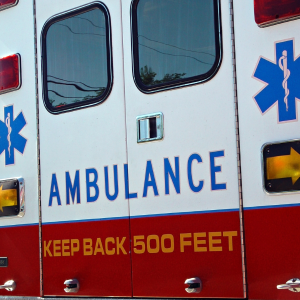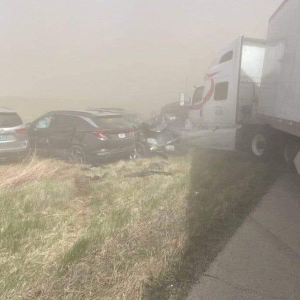Coping with PTSD after Traumatic Traffic Accidents

Interstate 55 may be open for traffic again after the deadly 70+ car pileup caused by a freak dust storm, but the lingering effects of post-traumatic stress disorder (PTSD) may impact involved drivers, rescue personnel and bystanders well beyond that day.
Felecia Hurley, of Chatham, was driving her daughter to the St. Louis airport when the sky was overcome with dirt and dust, and her visibility dropped to zero.
“I suddenly came upon a stopped semi,” she said. “I was able to slam on my brakes and swerve to the shoulder. I stopped for what felt like minutes, but was probably seconds. Then we heard a car slam into the semi. Then another semi smashed into the semi we were next to, and the semi we were next to was bouncing towards us. More crashing kept happening.”
Memorial Behavioral Health experts say accidents, whether major or minor, can lead to long-term psychological ramifications for those involved.
“PTSD occurs when people have experienced or witnessed a traumatic event,” said Amber Olson, LCSW, regional director for Memorial Behavioral Health. “What starts out as shock can evolve into a wider range of emotions including grief, anxiety, depression, fear and even survivors’ guilt.”
Common Physical and Behavioral Trauma Reactions
- Changes in sleep patterns, appetite
- Shallow or rapid breathing
- Headaches, stomach upset
- Withdrawal from others, crying episodes
- Irritability or angry outbursts
- Fear of being alone
Fortunately, Felecia and her family were unhurt, but they spent hours watching emergency personnel rescue people through the dust storm.

“The paramedics and firefighters were out there, but with so much dust flying, you could barely see,” she said. “It hurt to even open your eyes, but they were still efficient, caring and professional.”
Felecia and her family eventually made it to St. Louis safely, where they decided to spend the night, but sleeping proved difficult. That’s a common response to a traumatic event.
Mental health experts say PTSD symptoms can begin as soon as four weeks following an accident or can develop over the next year. They can be triggered by the sound of sirens, the smell of gasoline, the act of driving, loud noises or even seeing emergency personnel.
“The most important thing to do is to give yourself time to work through the emotional and physical recovery,” said Olson. “Find a trusted friend or family member to speak candidly with about what happened. You can also talk with a mental health professional who is trained in coping with trauma and grief.”
Stress Management Tips
- Seek out comfortable and familiar surroundings and avoid spending too much time alone.
- Share your thoughts and feelings with those who are supportive and helpful – don’t try to block recollections.
- Care for yourself: eat well, exercise and rest when necessary. Avoid stimulants like caffeine, chocolate, nicotine.
Need Help?
Memorial Behavioral Health provides outpatient behavioral health services for children, adolescents, young adults and adults. Programs address emotional, social and behavioral needs of individuals and their loved ones who experience difficulties across home, social and community settings.
Call Memorial Behavioral Health at 217-525-1064, Monday through Friday, 8:30 a.m. to 4:30 p.m. to be connected with services.